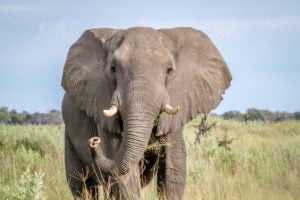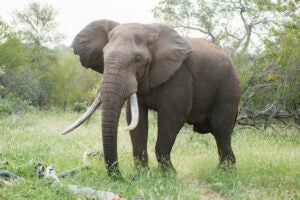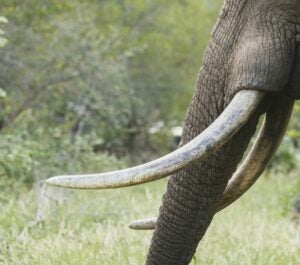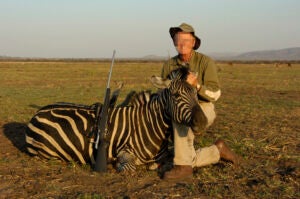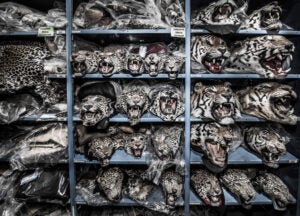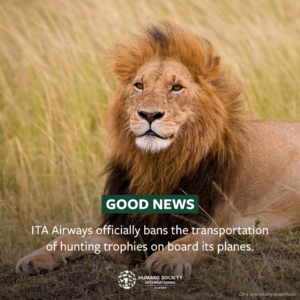
BRUSSELS—Humane Society International/Europe congratulates photographer Britta Jaschinski on winning the prestigious Wildlife Photographer of the Year 2024 award in the “Photojournalism” category. Organized by the Natural History Museum in London, this competition is recognized as one of the world’s most esteemed photography contests.
Jaschinski’s award-winning photo shows a new magnetic powder being applied to a confiscated elephant tusk. The technique can retrieve fingerprints up to 28 days after poachers handle the tusk, overcoming challenges posed by ivory’s porous nature. Over 200 kits of this powder have been distributed to border forces in Africa and Asia, aiding in cases involving trafficked ivory, tiger claws and rhino horn. The method is valued for its simplicity and effectiveness where DNA techniques cannot be used.
“Whether it is for trophies or to feed the demand for ivory, figures reveal that we are on track to wipe out one of the most iconic species by 2040.” says Britta Jaschinski. “Losing our beautiful elephants in the name of sport, power and greed is simply not acceptable. Lifting fingerprints of ivory and other confiscated wildlife is an important technique in the forensic tool kit and brings hope that we can disrupt and even dismantle entire trade chains. If we can’t save our most charismatic species, what hope is there for others? I am grateful to organisations like Humane Society International/Europe for amplifying these issues and for pushing for real political action to strengthen wildlife protection and in particular right now, to end the import of hunting trophies.”
HSI/Europe admires Jaschinski’s powerful work and has collaborated with her on the Still Life. Delivered– The macabre business of trophy hunting exhibition, which is part of the #NotInMyWorld campaign of the organization. The campaign highlights trophy hunting—the legal and senseless killing of iconic wild animals for sport which has severe environmental, ethical, social and economic impacts. Endangered species such as the hippopotamus, African elephant, African lion, leopard, brown bear and polar bear, turned into lifeless objects—from bottle openers to ashtrays—rendered as such by the barrel of a gun and immortalized by the lens of the camera. HSI/Europe’s campaign calls on the EU and its Member States to ban hunting trophy imports and urges businesses to stop supporting this practice. The Still Life. Delivered exhibition has appeared in Rome and Warsaw, with plans to travel to other cities to spotlight these works that expose how majestic living animals are killed by trophy hunters and turned into grim lifeless objects for mere personal satisfaction.
Through her work, the London-based photographer explores the human-nature relationship and its implications. Known for her distinctive style, she documents wildlife crimes and collaborates with international authorities and environmental organizations. As co-founder of Photographers Against Wildlife Crime™ and creator of The Evidence Project, she advocates for public awareness and political action to protect wildlife and natural habitats.
Ruud Tombrock, HSI/Europe executive director, congratulates Jaschinski on her award and emphasizes the urgency of political intervention: “Britta Jaschinski’s powerful images reveal the brutal reality behind trophy hunting and the immense suffering and exploitation of animals it involves and send a strong message to European policymakers to take decisive action to stop the import of these grotesque trophies. This is not just about protecting individual animals but preserving ecosystems and safeguarding the future of endangered species worldwide.”
Between 2013 and 2022, the European Union imported over 27,000 trophies from animals threatened by trade and listed under CITES (the Convention on International Trade in Endangered Species), making the EU the second-largest importer of hunting trophies after the United States. Among the species targeted are iconic animals such as hippos, rhinos, lions and polar bears.
Globally, there has been a strong movement away from the trophy hunting industry. Many countries, such as Colombia, Costa Rica, India, Kenya, Singapore, South Sudan and others already prohibit trophy hunting and/or trade in full or to a significant degree, while others, such as Argentina, Australia, Belgium, Canada, Finland, France, the Netherlands, the United States and others have some level of national trade restrictions for hunting trophies beyond CITES’ minimum requirements. Private industry has also emerged as a global leader in environmental sustainability and responsibility, with 45 transport companies prohibiting the transport of some or all hunting trophies on their carriers, including airlines from the world’s top five and EU’s top three largest airline groups.
View Jachinski’s award-winning photo. To download these visuals, email emheinen@hsi.org
END
Media contact: Eva-Maria Heinen, senior manager media and communications, HSI/Europe, emheinen@hsi.org; tel: +39 333 8608589


